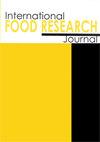Production and optimisation of used cooking palm oil into protected fat calcium salts by fusion method using response surface methodology (RSM)
IF 0.7
4区 农林科学
Q4 FOOD SCIENCE & TECHNOLOGY
引用次数: 0
Abstract
Used cooking oil (UCO) is a waste, and creates environmental issues due to its hydrophobic property. UCO, with its high content of fatty acid, can be used as source material for animal feed. However, high unsaturated fatty acid in UCO is harmful to the ruminant’s microflora. This can be resolved by transforming UCO into functional product such as ruminant’s protected fat (PF). In the present work, the production of used cooking oil protected fat (UCOPF) using fusion method via saponification process was investigated. Response surface methodology (RSM) was used to evaluate the effect of calcium oxide concentration (CaO), initial temperature (iTemp.), and percentage of water (H2O) on the solidification score and free fatty acid (FFA) content of PF. Results showed that all the studied parameters significantly affected the responses. The coefficient of determination (R2) for solidification score and FFA were high at 0.9433 and 0.9599, respectively. The optimum condition to produced UCOPF by fusion method was CaO (20%), iTemp. (80°C), and percentage of water (30%), which yielded solidification score and FFA of 5.33 ± 0.53 and 0.85 ± 0.07%, respectively. The FFA content of the optimised PF was lower than permitted; thus, it can be used as animal supplement. In conclusion, the UCO can be converted into PF by using calcium fusion method. However, the property and stability of the produced PF should be assessed prior to commercialisation.利用响应面法(RSM)融合法制备废烹饪棕榈油制备保护性脂肪钙盐及优化研究
用过的食用油(UCO)是一种废物,并且由于其疏水性而造成环境问题。UCO脂肪酸含量高,可作为动物饲料的原料。然而,UCO中的高不饱和脂肪酸对反刍动物的微生物群有害。这可以通过将UCO转化为功能性产品来解决,例如反刍动物的保护脂肪(PF)。研究了利用皂化法制备废食用油保护脂肪(UCOPF)的工艺。采用响应面法(RSM)评价了氧化钙浓度(CaO)、初始温度(iTemp.)和含水量(H2O)对PF凝固分数和游离脂肪酸(FFA)含量的影响,结果表明,所研究的参数均对响应有显著影响。凝固分数和FFA的决定系数(R2)分别为0.9433和0.9599。融合法制备UCOPF的最佳工艺条件为CaO(20%)、iTemp(20%)。(80°C),水的百分比(30%),凝固分数和FFA分别为5.33±0.53和0.85±0.07%。优化后的PF中FFA含量低于允许值;因此,它可以作为动物补充剂。综上所述,钙融合法可以将UCO转化为PF。然而,生产的PF的性质和稳定性应该在商业化之前进行评估。
本文章由计算机程序翻译,如有差异,请以英文原文为准。
求助全文
约1分钟内获得全文
求助全文
来源期刊

international food research journal
Agricultural and Biological Sciences-Food Science
CiteScore
1.40
自引率
0.00%
发文量
75
期刊介绍:
The International Food Research Journal (IFRJ) publishes papers in English, six (6) issues a year with the coverage of:
Food Science and Technology
Nutrition and Dietetics
Agriculture, multidisciplinary
Chemistry, multidisciplinary
The scope of the Journal includes:
Food Science, Food Technology and Food Biotechnology
Product Development and Sensory Evaluation
Food Habits, Nutrition, and Health
Food Safety and Quality
Food Chemistry, Food Microbiology, Food Analysis and Testing
Food Engineering
Food Packaging
Food Waste Management
Food Entrepreneur
Food Regulatory
Post-Harvest Food Management
Food Supply Chain Management
Halal Food and Management
 求助内容:
求助内容: 应助结果提醒方式:
应助结果提醒方式:


